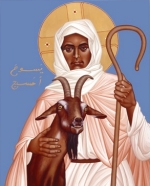As Christianity continued to spread throughout the ancient world its adherents were both influenced and challenged by religious and philosophical ideas such as astrology, Stoicism, Neo-Platonism and Gnosticism. Sometimes Christian apologists tried to reconcile these various ideas into a unified whole, while at others they challenged their influence, refuting some ideas as heretical.
Continue reading "Intellectual and Religious Cultural Influences on Early Christianity"
 Over the course of the semester we have examined various images of Jesus. I find myself drawn a few in particular to Denny Weaver’s Narrative Christus Victor, with its nonviolent overcoming of the systemic evils of the world and to the empathic subjective view of the atonement through which the sacrifice of Jesus and his ability to identify with the suffering of humanity elicit a response of love and transformation.
Over the course of the semester we have examined various images of Jesus. I find myself drawn a few in particular to Denny Weaver’s Narrative Christus Victor, with its nonviolent overcoming of the systemic evils of the world and to the empathic subjective view of the atonement through which the sacrifice of Jesus and his ability to identify with the suffering of humanity elicit a response of love and transformation. In John 15:1-7 we find Jesus delivering a monologue in which he describes a scene common to first-century Palestinians: a vineyard in which a vine is cultivated to produce fruit. Drawing out the analogy, the disciples are branches who draw their life sustenance from their connection to the vine. This image aligns well with the metaphor of Jesus the Life-Giver. [Instructor Comment: Right.] As he continues to explain, those who remain in him will bear much fruit. Inversely, those who are separated from him can do nothing without the life that he provides.
In John 15:1-7 we find Jesus delivering a monologue in which he describes a scene common to first-century Palestinians: a vineyard in which a vine is cultivated to produce fruit. Drawing out the analogy, the disciples are branches who draw their life sustenance from their connection to the vine. This image aligns well with the metaphor of Jesus the Life-Giver. [Instructor Comment: Right.] As he continues to explain, those who remain in him will bear much fruit. Inversely, those who are separated from him can do nothing without the life that he provides.